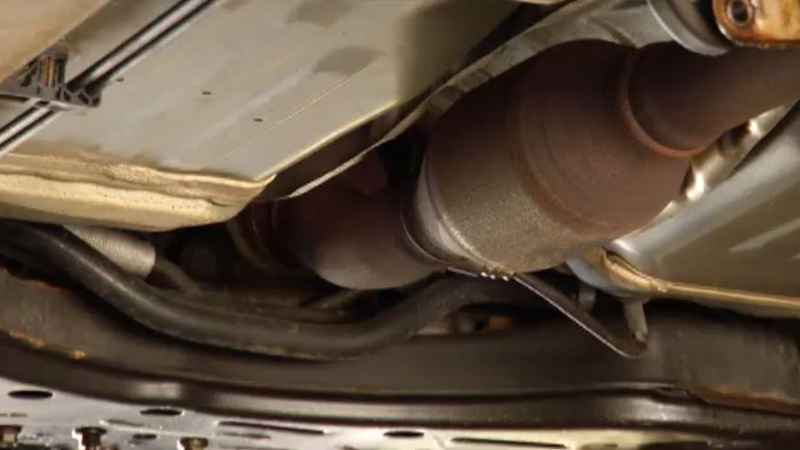With catalytic converter theft on the rise, police, lawmakers take action
The line of cars wound around the Allianz Field parking lot Saturday, but this wasn’t a sports event.
Instead, like a finely tuned assembly line, St. Paul police officers were doing their part to fight catalytic converter theft.
“We’ve had 600 catalytic converters stolen in St. Paul this year that are reported,” St. Paul Police Senior Commander Kurt Hallstrom said. “We’re just hearing from so many people that they’re spending thousands of dollars in repairs, and we’re trying to do something.”
Authorities say in St. Paul alone, they’re seeing an average of nearly six converters stolen every day.
Police say they can be sawed off and removed in minutes.

[KSTP]
“We’ve had a lot of unreported catalytic converters,” Hallstrom said. “Some people are reporting their second or third one to us, and they didn’t report the first one or two.”
So officers used wheeled flat boards — the kind you might see a mechanic use — to gain access to the undercarriages of cars. They used an "SPPD" stencil and orange spray paint to mark the converters.
“Maybe the recyclers will see that paint, that stencil and say, ‘We’re not going to buy that one,’” Hallstrom said. “And then the thieves will not steal that one, so maybe they’ll see it and move on.”
Police say thieves will sell the emission control devices to a scrapyard for up to $500 apiece. Experts say the lucrative price has to do with the metallic coating on the outside.
"The precious metals in these things," says State Sen. John Marty, DFL-Roseville. “Tiny amounts of the precious metals — platinum, rhodium and palladium. One of those sells for like $26,000 an ounce.”
Police say it’s easy to sell converters illegally since they currently have no markings to show where they’re from.
"It’s a huge problem, and it’s been fast,” Marty said. “These are little pieces of metal on the bottom of our cars that don’t have any markings to identify which car they go to or anything.”
He’s proposed a bill that would put tighter restrictions on converters, making them in effect, contraband.
"It would be illegal to possess a used catalytic converter that’s detached from a car unless it has certain markings on it, the VIN number on it,” Marty said. “And if you’re in possession of a catalytic converter not attached to a car and doesn’t have a VIN number in Minnesota, you’re breaking the law.”
The proposal would also permit only licensed scrap dealers to buy a used converter. The seller would have to provide a VIN and a title.
That’s a big change from the current situation, with unmarked converters.
"We’re finding that officers are stopping cars and there’ll be three or four of them in the trunk,” Hallstrom said. “If we verify where that catalytic converter came from, there’s nothing we can do with it."
Marty’s bill would also require scrap metal dealers to hold for one week any catalytic converters they’ve purchased. Payments would be mailed to the seller or electronically deposited so there would be a paper trail for law enforcement to follow.
Police say 900 people signed up for the car clinic Saturday. They say if your converter is stolen, you’ll hear a loud roaring noise coming from beneath your car, and they warn getting a replacement isn’t cheap.
“It’s a huge hit on people,” Marty said. “It can cost them $3,000 to $4,000 to get them replaced.”
He says the bill will advise a simple step to make converters less prone to theft by using a permanent marker.
“We’d be instructing any auto repair or any auto scrap yard or anybody taking off your catalytic converter, as soon as you take it off, use a magic marker or a permanent marker and just write the VIN number on it,” Marty said.